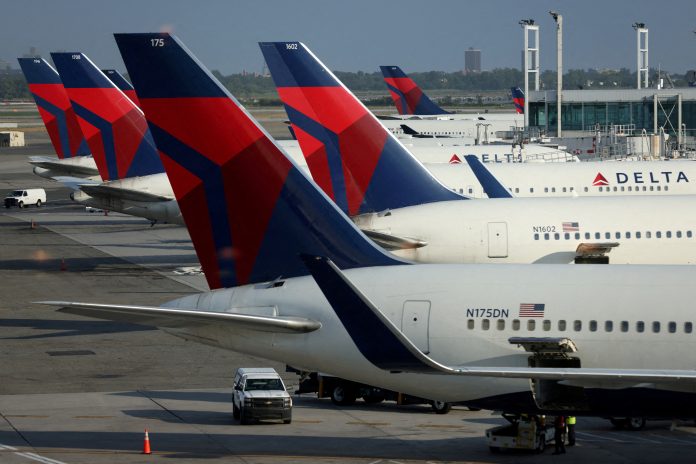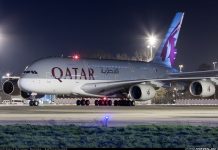Delta Air Lines (NYSE: DAL) has released its financial and operational results for the June quarter of 2025, marking a record-setting period with strong profitability, robust operational performance, and continued investments in customer experience and sustainability. The airline also shared its outlook for the September quarter and full year 2025, demonstrating optimism grounded in solid financial and operational foundations.
According to Ed Bastian, Delta’s Chief Executive Officer, the company achieved record revenue and industry-leading performance across key operational metrics during the quarter, reflecting the remarkable contributions of Delta’s workforce. Delta posted $1.8 billion in pre-tax profit on a 13 percent operating margin and reaffirmed its confidence in achieving full-year earnings per share between $5.25 and $6.25, with expected free cash flow ranging from $3 to $4 billion.
On a GAAP basis, the airline reported operating revenue of $16.6 billion, operating income of $2.1 billion (a 12.6 percent margin), and pre-tax income of $2.6 billion (a 15.5 percent margin), resulting in earnings per share of $3.27. Delta’s operating cash flow for the quarter was $1.9 billion, and the airline made $2.9 billion in payments toward debt and finance lease obligations, reducing total debt to $15.1 billion by quarter-end.
On a non-GAAP basis, Delta’s adjusted operating revenue was $15.5 billion, representing a 1 percent increase from the same quarter last year. Adjusted operating income was $2.0 billion (a 13.2 percent margin), with pre-tax income of $1.8 billion (an 11.6 percent margin) and adjusted earnings per share of $2.10. Operating cash flow stood at $1.8 billion.
President Glen Hauenstein attributed the strong revenue performance to Delta’s diverse, high-margin revenue streams and structural advantages. While total revenue increased 1 percent on a 4 percent capacity growth, adjusted unit revenue declined by 3 percent compared to the prior year, consistent with expectations. Premium cabin revenue outpaced main cabin growth, rising 5 percent year-over-year. Loyalty revenue climbed 8 percent, driven by strong co-branded card usage and new acquisitions, while American Express remuneration rose 10 percent to $2 billion. Cargo revenue grew 7 percent, and Maintenance, Repair, and Overhaul (MRO) services revenue surged 29 percent.
Delta’s international operations also performed strongly during the peak summer period. Revenue from international travel grew 2 percent year-over-year, with the Pacific region recording an 11 percent increase, fueled by the restoration of the Transpacific network and double-digit capacity growth. Transatlantic travel remained robust, with revenue up 2 percent over the 2024 record. Corporate travel demand remained stable, with corporate ticket sales posting low-single-digit growth over the prior year, primarily driven by domestic travel.
Cost performance remained a key area of focus. Non-fuel unit costs for the June quarter grew 2.7 percent year-over-year, in line with expectations. Operating expenses were reported at $14.5 billion, while adjusted operating expenses totaled $13.5 billion. Adjusted non-fuel costs stood at $10.5 billion, and non-fuel CASM (cost per available seat mile) was 13.49¢. Adjusted fuel expenses were $2.5 billion, reflecting an 11 percent decrease from the previous year, with the adjusted fuel price per gallon falling 14 percent to $2.26.
Chief Financial Officer Dan Janki stated that the September quarter is expected to reflect Delta’s best non-fuel cost performance for the year, with unit costs projected to be flat or slightly lower year-over-year. For the full year, Delta is on track to maintain low-single-digit growth in non-fuel unit costs, consistent with its long-term cost structure goals.
Delta also made significant progress in deleveraging its balance sheet. Adjusted net debt stood at $16.3 billion at quarter-end, down $1.7 billion from the end of 2024. Payments on debt and lease obligations totaled $2.9 billion, and the weighted average interest rate on debt remained favorable at 4.6 percent, with 95 percent of the debt fixed. Delta reported liquidity of $6.4 billion, including $3.1 billion in undrawn revolver capacity. With adjusted operating cash flow of $1.8 billion and gross capital expenditures of $1.2 billion, the airline generated $733 million in free cash flow for the quarter.
Operationally, Delta continued to deliver excellence, earning the title of Best U.S. Airline by The Points Guy for the seventh year in a row. It was the most on-time airline in the June quarter, leading its network peers in departure, arrival, and completion metrics. Delta added 10 aircraft to its fleet in the quarter, including the A350-900, A330-900, A321neo, and A220-300, bringing total deliveries for the year to 19. It retired 10 aircraft in the same period.
The airline announced several strategic expansions, including a minority equity stake in WestJet to enhance transborder travel, plans to build a global partnership with IndiGo, Air France-KLM, and Virgin Atlantic to improve connectivity between India, Europe, and North America, and an expanded joint venture with LATAM into Argentina. New nonstop flights were launched from Salt Lake City to Seoul-Incheon and plans announced for future services from Seattle to Barcelona and Rome. Delta also operated its most extensive transatlantic schedule ever, adding new or expanded service to major European destinations.
Culturally, Delta continued investing in its people, accruing $470 million toward profit sharing for the quarter and implementing a 4 percent base pay increase for eligible employees. The airline ranked No. 3 in the Fortune ReturnOnLeadership® ranking and was recognized as one of the top 50 community-minded companies in the U.S. Delta chartered over 20 World War II veterans to France for the D-Day anniversary and maintained its position as the No. 1 blood drive sponsor with the American Red Cross. In April, over 4,400 Delta volunteers contributed more than 8,600 service hours during Global Volunteer Month.
On the customer experience front, Delta received numerous accolades, including being named No. 1 in J.D. Power’s Premium Economy Satisfaction survey for the third consecutive year and Best Airline Staff in North America at the Skytrax World Airline Awards. The airline launched Fly Delta app 7.0, opened new lounges in Seattle and Atlanta, and announced new cabin product experiences beginning October 1. A partnership with Uber now allows SkyMiles members to earn miles on select rides and food deliveries. Collaborations with Missoni refreshed in-flight amenities, and the rollout of fast, free Wi-Fi for SkyMiles Members expanded to 925 aircraft, with 95 percent of the mainline fleet expected to be equipped by the end of 2025.
In terms of sustainability, Delta released its 2024 Delta Difference Report, outlining its commitment to a greener aviation future. The airline achieved a 1 percent improvement in fuel efficiency through operational enhancements, saving approximately 45 million gallons of jet fuel.
As Delta celebrates its centennial year, it remains focused on strategic execution, operational excellence, and innovation, positioning itself for continued success in the evolving global aviation landscape.
















